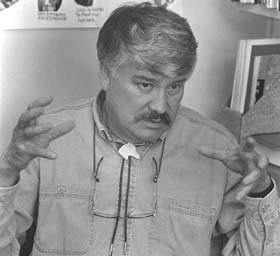
Back in the 1980s, when I first met him near Paddle Prairie, Alberta, about 500 kilometres northwest of Edmonton, Elmer Ghostkeeper had just moved onto land he’d inherited from his father. The 350-acre lot of bush and farmland was then one of eight Metis Federation Settlements of Alberta. And as precious as that place had been to his family for generations, his inheritance was never about ownership.
“The land doesn’t belong to me,” Ghostkeeper told me in an interview in 1981. “What’s more,” as he pointed out in his 1996 book Spirit Giving, “Canadians have to shift from living off the land to living with it.”
Last month, the Conservative government in Ontario introduced Bill 5. It is legislation that Premier Doug Ford believes will put shovels into the ground more quickly, build infrastructure more widely, and harness the Ring of Fire (natural resources of northern Ontario) more efficiently.
The so-called Protect Ontario by Unleashing Our Economy Act amounts to racing development policies through the Ontario legislature in order to visibly combat Donald Trump’s crippling tariffs against Ontario products and industry. It’s Ford’s equivalent of Trump’s “Drill, Baby, drill.”
And the way Ford has framed it, especially when anybody suggests he’s ramrodding Conservative legislation through Queen’s Park, it comes across as his way or the highway. In fact, he pretty much dismisses those opposing Bill 5 as “radical environmentalists.”

Well, that hasn’t gone over very well among those who are the principal stewards of lands in the Ring of Fire – First Nations people. Dean Sayers, a spokesman for the Robinson Huron Treaty Chiefs didn’t mince words in his reaction.
“Somebody has been ill-advising you that what you’re doing is actually aligned with law,” Sayers told the Ontario government. “It’s not. You’re breaking Ontario law. You’re breaking Canada’s law. You’re breaking international law. And most important you’re breaking Anishinaabe law, the promises we made in witness of all creation.”
If that sounds vague or highfalutin, look a little closer at the way the Ford government has chosen to make these changes. If Bill 5 is passed (and with the Conservatives holding a majority at Queen’s Park, it’s pretty much guaranteed), it gives the minister of economic development absolute authority to select “trusted proponents” for “designated projects.”
That means the premier can give Vic Fedeli, the minister of economic development, absolute authority to green-light everything from Ford’s harebrained idea to dig a tunnel under Hwy 401 to strip mining any piece of Ontario’s northlands no matter who or what is on top of it, including First Nations’ communities and reserves.
“When we made our treaties with you, we brought a canoe full of everything that we were going to exercise as our inherent rights over law, language and culture … everything where underlying title has been proven,” Dean Sayers said this week. “And in return, we gave you a little access to natural resources. You need to take that inventory and align it with what you actually have jurisdiction over. We did not give you jurisdiction over everything.”

Isn’t it interesting, in contrast, when King Charles III read the speech from the throne last week, outlining the Liberal government’s economic agenda, he did so with prominent Indigenous leaders on hand in the Senate and the text included provisions such as, “The time needed to approve a project will (uphold) Canada’s world-leading environmental standards and its constitutional obligations to Indigenous Peoples.”
Meanwhile at Queen’s Park, the Ford Conservatives told the Ontario Legislature that it had to have Bill 5 voted on by the end of the week. Here’s how First Nations spokesman Dean Sayers reacted to that:
“If you’re going to do anything, you need to get our permission. You need our consent. Read my lips. Because if you don’t get our permission, you ain’t doing it! So, let’s engage. Let’s consult,” he said.
Only after the Ford government realized that Bill 5 might actually be illegal, did it rewrite portions of the legislation to affirm “existing Aboriginal and treaty rights … including the duty to consult.”
My acquaintance from all those years ago, Metis elder Elmer Ghostkeeper, had a First Nations phrase to describe the process in which Western scientific knowledge works in tandem with Aboriginal knowledge. “Wechewehtowin,” he told me. “It means setting off together on a journey.”
If the Ford administration really wants to show how different it is from the Trump one, perhaps it could listen to First Nations people who have both the law and understanding on their side.